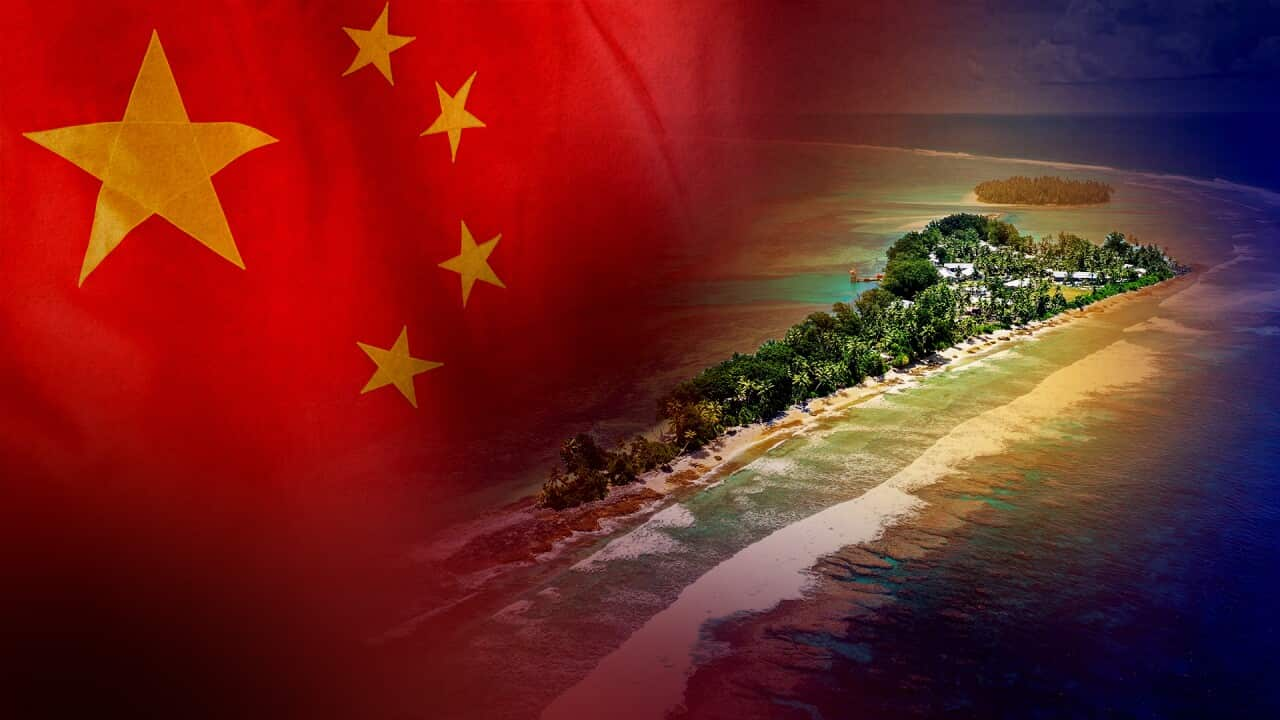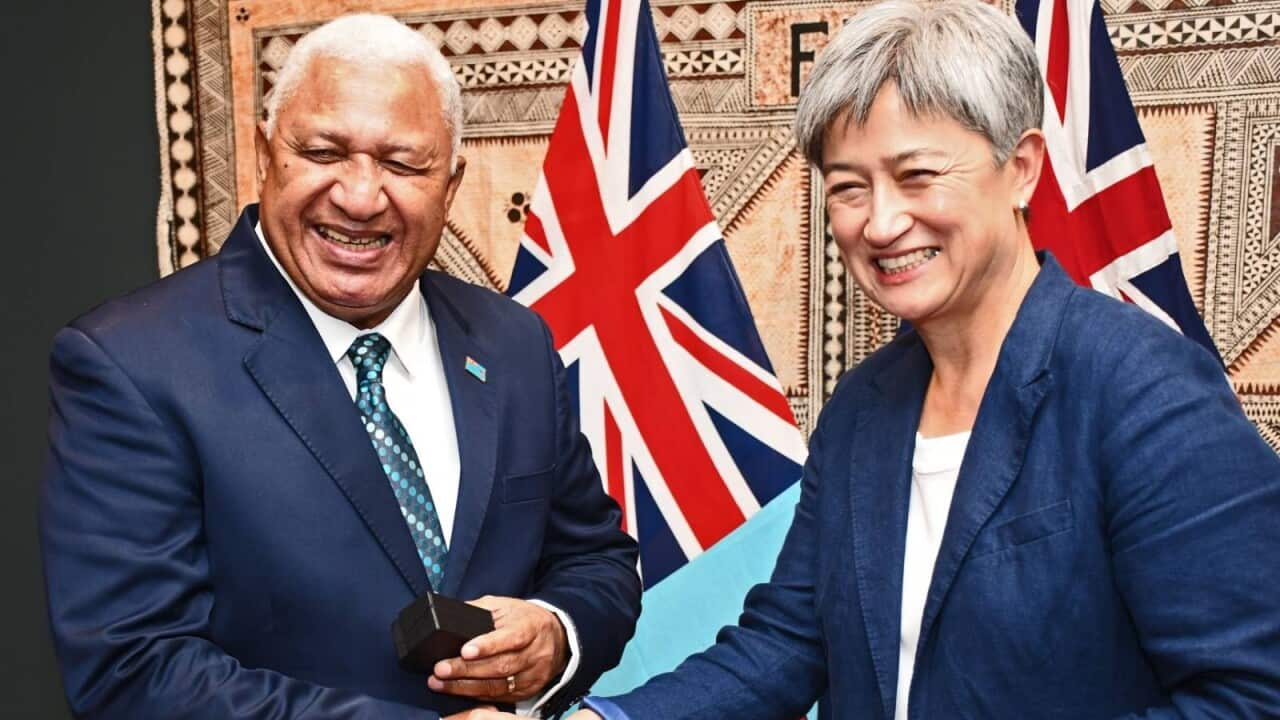Australia has announced an eight-year deal with Samoa to support human development in the Pacific nation, in addition to a new maritime patrol boat.
Foreign Minister Penny Wong made the pledge on her second trip to the Pacific since she was sworn in nine days ago.
It comes as Samoa marks the 60th year of its independence.
Samoan prime minister Fiame Naomi Mata’afa hosted Senator Wong on Thursday, where the pair discussed regional security issues, climate action and development assistance.
Senator Wong, who also met with Samoa's head of state Tuimalealiifano Vaaletoa Sualauvi II, used the trip to pledge a replacement Guardian class patrol boat to assist with maritime surveillance in the region.
She said Australia would work with Samoa as part of an eight-year partnership agreement to improve "human development and social inclusion challenges".
China's region-wide deal rebuffed
China's bid to get 10 Pacific island nations to sign on to its proposal for a region-wide deal on security and trade .
But China's foreign minister Wang Yi continues to tour Pacific island nations to sign a number of bilateral agreements and sell Beijing's regional development plan.
"The Chinese spokespeople have made clear this will be a continued aspect of Chinese policy towards the region," Senator Wong told the ABC on Friday.
"What we're seeing is China being much more active in the region.
"What we have to do is to lift our engagement in the region. We will engage with the Pacific bearing in mind we are part of the Pacific family, we're not an external partner."
Ms Mata'afa said China's proposal was presented in a hasty manner, adding that any regional issues should instead be put before the Pacific Islands Forum for consultation.
"Our position is that you cannot have a regional agreement when the region hasn't met to discuss it," she during a joint press conference with Ms Wong in Samoa's capital, Apia, on Thursday.
"And to be called in to have the discussion and have the expectation that there would be a comprehensive decision or outcome was something that we could not agree to.
"I think that the region has come to that conclusion: that we need to meet as a region to consider any proposal that is put to us by our development partners that requires a regional agreement."
Ms Wong said Australia supports Samoa's decision to at this stage reject a regional security agreement with China.
"It just seemed a bit abnormal because the (Chinese) minister of foreign affairs was here, and there was this particular proposal from the Chinese that they were seeking regional agreement on," Ms Wong said.
"Our position was that you cannot have regional agreement when the region hasn't met to discuss it."
Senator Wong says while sovereign nations are free to make their own decisions, issues that impact regional security need collective consideration.
"Your prime minister has shown a lot of leadership and wisdom not only now but in many of the statements about the importance of robust regional architecture (and) respectful, regional processes to deal with some of the external circumstances we all find ourselves in," Ms Wong said.
Senator Wong will hold talks in Tonga on Friday where she will meet with prime minister Hu'akavemeiliku Siaosi Sovaleni and foreign minister Fekitamoeloa 'Utoikamanu.
The visits come within days of China signing bilateral agreements with Samoa and Tonga and alongside a 10-country travel blitz through the region by China's foreign minister Wang Yi.
Mr Wang is in Papua New Guinea just days after China put the regional security proposition on ice and watered down its proposal for the region in a release of its new position paper.
PNG Prime Minister James Marape has criticised the timing of Mr Wang's trip ahead of the country's election, saying no agreement should be signed before polling day and that it would be "improper" for China to offer security support in the run up to the election.

PNG's Prime Minister James Marape has indicated his government is unlikely to sign a new security deal with China due to its strong defence ties with Australia. Source: Getty / Peter Foley
Despite visiting Fiji after her Chinese counterpart, Senator Wong will not visit PNG as the country prepares for its election.
"This is not an appropriate time for us to visit during the election campaign. As soon as the election is resolved, obviously, the prime minister and myself and other senior ministers will be very keen to engage with PNG again," she said.
"(Pacific) leaders understand the circumstances in which we live. We need to focus on how we work with regional regional partners for their development, for climate and for the border security issues."
Mr Albanese and Senator Wong are due to travel to Indonesia on Sunday for a three-day trip to strengthen ties.
Senator Wong says she won't telegraph what she and her counterpart are due to discuss but "all the nations of the region understand that we are in a time of great change and that our region is being reshaped".
After the push for the region-wide deal stalled, China instead issued a position paper on the Pacific, covering areas such as security and development, along with greater dialogue and diplomatic ties.
In an editorial, the state-owned China Daily criticised the alarm from Australia, the United States, New Zealand and Japan over Wang's Pacific islands visit as unwarranted.
China said it had offered "pragmatic measures" tailored to the development needs of needs of the Pacific islands.

The President of Fiji, Ratu Wiliame Katonivere, right, gestures with the Chinese Foreign Minister Wang Yi, left, at the State House in Suva, Fiji, Monday, 30 May 2022. Credit: HOGP/AP
The foreign minister says she has received correspondence from her Chinese counterpart following her election and would respond in due course as appropriate.
The Chinese premier has also reached out to Prime Minister Anthony Albanese, who also said he would respond in due course.
Mr Albanese and Senator Wong are due to travel to Indonesia on Sunday for a three-day trip to strengthen ties.
Senator Wong says she won't telegraph what she and her counterpart are due to discuss but "all the nations of the region understand that we are in a time of great change and that our region is being reshaped".
Stronger stance on climate change welcomed
There was a welcome for Australia's policy shift on climate change, which has brought it more into line with its Pacific neighbours and is likely to strengthen its ties with the region.
"Climate change, of course, is very high on the priorities of both our respective governments," Ms Mata'afa said.
"Senator, with your policy stance we are greatly encouraged.
"With the new Australian government, the policy shift brings them closer into alignment with the Pacific's advocacy for climate change.
"We feel that this will strengthen the Pacific's position on climate change."
Meanwhile, the European Union's special envoy to the region says Australia, the United States and Europe need to step up their engagement on climate change, investment and COVID-19 aid in the Pacific.
Gabriele Visentin said the bloc was working with its partners to increase its presence and support the region's growth in a sustainable manner.
Engagement on climate change, investment in connectivity within the Pacific and strengthening vaccination efforts and COVID-19 aid are all areas where partnerships can be stronger, Mr Visentin said in Canberra on Thursday.
"It's not a matter of increasing influence. It's a matter of becoming a credible partner who treats the Pacific island states as sovereign countries able to take sovereign decisions for their long-term interests," he said.
"We welcome our partners like the US and Australia addressing the Pacific states with respect.
"Showing them that we have a complete empathy and understanding of their needs proves effective."
With Reuters












